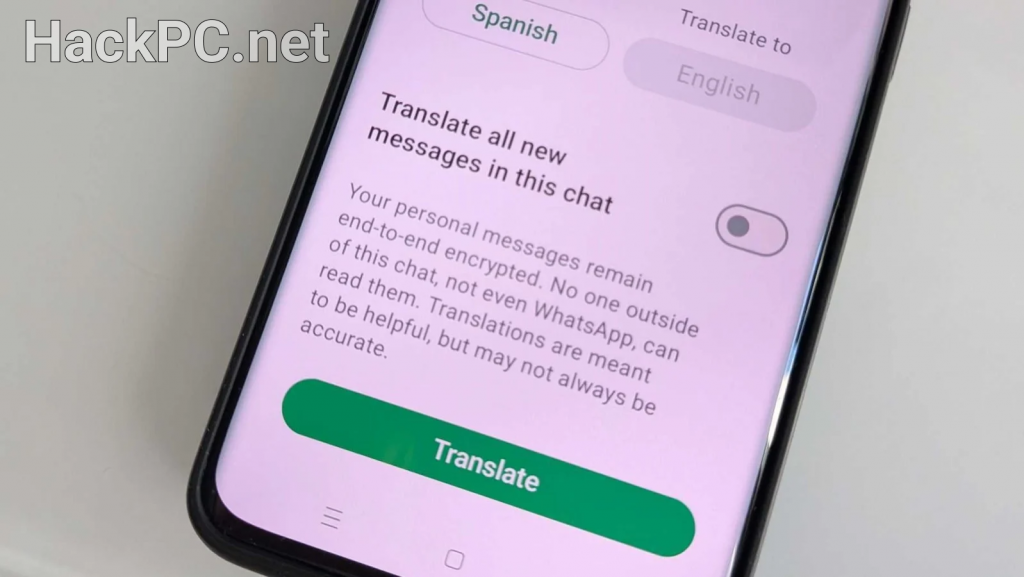
WhatsApp’s transformation from a simple messaging platform into an AI-enhanced communication powerhouse reflects a broader shift in how we interact with technology. Meta AI integration brings intelligent assistant capabilities directly into WhatsApp, enabling users to generate images, get writing assistance, and receive instant answers without leaving their conversations. This comprehensive review examines the sophisticated machine learning features, privacy implications, and real-world performance of WhatsApp’s latest artificial intelligence capabilities.
Meta AI: The Intelligent Conversational Assistant at Your Fingertips
The heart of WhatsApp’s AI revolution centers on Meta AI, a conversational chatbot powered by Meta’s advanced Llama large language model that helps users with everything from solving math problems to editing photos or finding restaurants everyone in a group chat can agree on. Unlike traditional chatbots that require separate applications, this intelligent assistant seamlessly integrates into existing chat workflows, making artificial intelligence features accessible through familiar messaging interfaces.
Currently available in limited countries with support for English, Arabic, French, German, Hindi, Indonesian, Italian, Portuguese, Spanish, Tagalog, Thai, and Vietnamese languages, the AI assistant represents a significant expansion of WhatsApp’s core functionality. Users can invoke the digital assistant by tapping the distinctive blue ring icon or simply typing “@Meta AI” within any conversation, transforming routine chats into productive AI-powered sessions.
The implementation feels remarkably intuitive. Whether you’re drafting professional emails, planning weekend activities, or seeking quick answers to complex questions, the conversational AI responds with contextually relevant suggestions. The latest iteration, built with Meta Llama 3, delivers faster, smarter responses compared to previous versions, with real-time information access that eliminates the need to switch between applications.
Revolutionary Image Generation and Creative AI Tools
Perhaps the most visually striking addition to WhatsApp’s AI arsenal is the sophisticated image generation capability. By typing “imagine” followed by a text prompt, users can create custom AI-generated images, with the ability to add, subtract, or animate elements to achieve their desired result. This generative AI technology transforms creative expression within messaging, enabling users to craft unique visual content for group icons, video call backgrounds, or simply to share imaginative creations with friends.
The personalization features take creative possibilities even further. The “Imagine me” function allows users to generate personalized images of themselves in various scenarios after a quick setup process, from trying different outfits to appearing as superheroes. This beta feature, currently available in the United States, demonstrates how machine learning algorithms can blend personal identity with creative exploration.
The image generation system now produces visuals as users type, creating album artwork, decor inspiration, animated custom GIFs, and more with unprecedented speed. The real-time rendering capability showcases significant improvements in computational efficiency and neural network optimization, making professional-grade image creation accessible to everyday messaging users.
Private Processing Technology: Maintaining End-to-End Encryption with AI Features
The integration of artificial intelligence into encrypted messaging presents unique technical challenges. WhatsApp addresses these concerns through innovative Private Processing technology that maintains user privacy while enabling intelligent features. Message Summaries utilize Private Processing technology, allowing Meta AI to generate responses without Meta or WhatsApp accessing users’ messages or private summaries.
This cryptographic breakthrough enables several privacy-preserving AI capabilities:
Message Summaries for Efficient Communication
The AI-powered message summarization feature helps users quickly catch up on unread messages in chats, with summaries visible only to the individual user. When rushing between meetings or catching up after being offline, this optional feature provides quick overviews of conversations while maintaining complete privacy protection.

Writing Help with Style Adaptation
The Writing Help feature offers AI-powered message composition assistance with various style options including professional, funny, or supportive tones, all while keeping messages completely private through Private Processing technology. The contextual writing assistant analyzes draft messages and suggests improvements without compromising encryption standards.
Advanced Chat Privacy Controls
The Advanced Chat Privacy setting blocks others from exporting chats, prevents auto-downloading media, and restricts using messages for AI features, providing enhanced protection for sensitive conversations. When enabled on a per-chat basis, this feature prevents conversations from being exported, disables automatic media downloads, and blocks certain AI feature usage.
Business AI Integration: Transforming Customer Service and Marketing
WhatsApp’s AI evolution extends beyond personal messaging into sophisticated business applications. Meta is introducing centralized marketing campaigns, expanded AI support, and calling options for businesses using WhatsApp, allowing companies to streamline their marketing strategy across WhatsApp, Facebook, and Instagram through Ads Manager.
The business-focused AI capabilities include:
- Automated Customer Support: AI systems that make personalized product recommendations and facilitate sales on business websites, then follow up with customers to answer questions or provide updates directly in WhatsApp chats
- Voice and Video Integration: Larger businesses using the WhatsApp Business Platform can now receive calls from customers and make direct calls once customers request contact, with voice messages and video calls becoming available for telehealth appointments and enhanced support
- Marketing Campaign Optimization: Intelligent budget allocation across placements using Advantage+ AI systems to maximize advertising performance
Technical Architecture and Implementation Details
The underlying technology powering WhatsApp’s AI features represents significant engineering advancement. Meta AI is built on Meta’s latest Llama large language model, a sophisticated neural network architecture trained on diverse datasets to understand natural language processing, computer vision, and generative tasks.
The implementation leverages several key technologies:
- Natural Language Processing (NLP): Advanced text understanding and generation capabilities that enable contextual conversations
- Computer Vision Models: Image recognition and generation systems for creative AI features
- Federated Learning: Privacy-preserving machine learning that processes data locally
- Edge Computing: On-device processing for sensitive operations to maintain encryption
The generative AI technology is trained on various data types including text and images, with privacy and safety guardrails protecting user information while ensuring positive experiences. The system architecture balances computational requirements with privacy preservation, demonstrating sophisticated engineering in distributed AI systems.
Privacy Implications and Data Security Considerations
The intersection of artificial intelligence and encrypted messaging raises important privacy questions. Meta AI uses information consistent with Meta’s Privacy Policy, and in some countries, may access data from connected Facebook or Instagram accounts to provide more relevant responses. This cross-platform data integration enhances personalization but introduces complexity in privacy management.
Critical privacy safeguards include:
- Only messages mentioning @Meta AI or explicitly shared with Meta AI can be read by Meta, with all other personal chat messages remaining inaccessible
- Personal messages and calls remain protected with end-to-end encryption, with Private Processing technology ensuring Meta AI generates responses without accessing message content
- Optional opt-in for all AI features, with granular controls for individual functionalities
However, users should understand the distinction between encrypted personal messages and AI interactions. While chat contents between users remain end-to-end encrypted, interactions with Meta AI are not encrypted in the same way, requiring careful consideration when sharing sensitive information with the AI assistant.
Performance Analysis and Real-World Usage
The practical performance of WhatsApp’s AI features reveals both impressive capabilities and areas for refinement. Response times for general queries typically range from instantaneous to a few seconds, depending on query complexity and server load. Image generation, while remarkably fast compared to standalone AI art platforms, occasionally produces inconsistent results requiring multiple attempts for optimal output.
Language support remains a limiting factor for global adoption. The features initially roll out in the U.S. with English language support, with expansion to more countries and languages planned throughout the year. This phased deployment approach allows for iterative improvements based on user feedback but creates disparities in feature availability across regions.
The intelligent assistant excels at:
- Quick factual queries and calculations
- Creative writing assistance with tone adaptation
- Visual content generation for social sharing
- Meeting coordination and group decision-making
- Educational support and explanations
Areas requiring improvement include:
- Complex multi-step reasoning tasks
- Highly specialized professional queries
- Cultural context understanding across languages
- Consistent image generation quality
- Integration with external services and APIs
Comparative Analysis with Competing Platforms
WhatsApp’s AI implementation differs significantly from competitors like Telegram, Signal, and traditional AI assistants. While Telegram offers bot ecosystems and Signal prioritizes absolute privacy without AI features, WhatsApp strikes a middle ground—integrating sophisticated AI while attempting to preserve encryption standards through Private Processing technology.
The seamless integration within existing chat interfaces provides advantages over standalone AI applications like ChatGPT or Google’s Bard, eliminating context switching and enabling collaborative AI usage in group conversations. However, the feature set remains less comprehensive than dedicated AI platforms, reflecting design choices prioritizing messaging integration over maximum AI capability.
Future Developments and Industry Implications
The roadmap includes AI-enabled voice support capabilities, paving the way for natural language voice interactions within encrypted messaging. This evolution toward multimodal AI—combining text, image, voice, and potentially video understanding—represents the next frontier in conversational artificial intelligence.
The broader implications for the messaging industry include:
- Privacy-Preserving AI Standards: WhatsApp’s Private Processing technology may establish new benchmarks for implementing AI within encrypted systems, influencing industry-wide approaches to privacy-conscious machine learning
- Business Communication Evolution: AI-powered customer service and marketing automation transform how businesses interact with consumers, potentially replacing traditional chatbot systems
- Creative Expression Democratization: Accessible image generation and content creation tools lower barriers to visual communication, changing how people express themselves digitally
- Regulatory Considerations: The integration of AI into encrypted messaging platforms raises questions about content moderation, data governance, and regulatory compliance across jurisdictions

User Control and Customization Options
WhatsApp emphasizes user agency in AI feature adoption. All Private Processing features including Writing Help and Message Summaries are optional and disabled by default, requiring explicit user activation. This opt-in approach respects user preferences while enabling gradual feature discovery.
Customization capabilities include:
- Per-chat privacy settings for granular control
- Style selection for writing assistance (professional, casual, supportive)
- Image generation prompt refinement and iteration
- AI feature blocking in specific conversations
- Setup photo management for personalized image generation
The settings architecture, accessible through Settings > Chats > Private Processing, provides centralized management while maintaining flexibility for conversation-specific preferences. Users can enable Advanced Chat Privacy by tapping the chat name and selecting the privacy option, demonstrating thoughtful UX design for privacy control accessibility.
Critical Evaluation and Limitations
While WhatsApp’s AI integration represents significant technological advancement, several limitations warrant consideration:
Technical Constraints: The reliance on cloud processing for complex AI tasks creates latency and requires internet connectivity, limiting offline functionality. Private Processing technology, while innovative, adds computational overhead that may impact performance on older devices.
Privacy Trade-offs: Despite encryption preservation efforts, the fundamental tension between AI functionality and absolute privacy remains. The Electronic Frontier Foundation notes that while Advanced Chat Privacy offers some control, confusion exists around exact functionality and privacy implications.
Feature Availability: Geographic and linguistic restrictions limit global accessibility, creating digital divides between regions with full AI features and those without access. The phased rollout approach, while pragmatic, frustrates users in unsupported markets.
Quality Consistency: Image generation and writing assistance occasionally produce suboptimal results, requiring multiple attempts or manual refinement. The AI’s understanding of context, particularly in group conversations, sometimes lacks nuance.
Best Practices for WhatsApp AI Usage
Maximizing value from WhatsApp’s AI features requires strategic usage:
- Privacy-First Approach: Enable Advanced Chat Privacy for sensitive conversations before utilizing AI features
- Clear Prompting: Provide specific, detailed prompts for image generation and writing assistance to achieve desired results
- Iterative Refinement: Use the edit and regeneration capabilities to progressively improve AI outputs
- Appropriate Context: Reserve AI assistance for suitable tasks—avoid sharing confidential information with the AI assistant
- Feature Exploration: Experiment with different AI capabilities to discover unexpected use cases and productivity enhancements
Security Recommendations
Users should implement these security measures when using AI features:
- Regularly review privacy settings and connected accounts
- Avoid sharing personally identifiable information in AI queries
- Understand the distinction between encrypted chats and AI interactions
- Monitor which conversations have AI features enabled
- Stay informed about privacy policy updates and feature changes
Verdict: Sophisticated Integration with Room for Growth
WhatsApp’s AI features represent a thoughtful balance between innovation and user protection, though not without complexity. The integration of Meta AI, image generation, and intelligent writing assistance transforms the messaging experience while Private Processing technology demonstrates commitment to privacy preservation. The team continues improving Meta AI responses rapidly, introducing enhancements every two weeks, suggesting ongoing refinement based on user feedback.
The implementation excels in accessibility—bringing sophisticated AI capabilities to billions of users through familiar interfaces. The privacy-preserving architecture, while imperfect, establishes important precedents for AI integration within encrypted platforms. However, geographic limitations, occasional quality inconsistencies, and privacy complexity require continued attention.
For users seeking AI-enhanced messaging without abandoning encryption, WhatsApp’s approach offers compelling functionality. The platform successfully democratizes artificial intelligence while maintaining core messaging security, though users must navigate the nuanced relationship between AI features and privacy protection.
As artificial intelligence becomes increasingly central to digital communication, WhatsApp’s implementation provides a glimpse of messaging’s future—intelligent, creative, and privacy-conscious, though still evolving. The success of these features will ultimately depend on continued technical refinement, expanded availability, and user education about capabilities and limitations.
The transformation of WhatsApp from simple messaging app to AI-powered communication platform marks a significant milestone in conversational technology evolution. While challenges remain, the foundation for intelligent, encrypted messaging has been established, setting the stage for continued innovation in how we connect, create, and communicate digitally.



Comments (0)